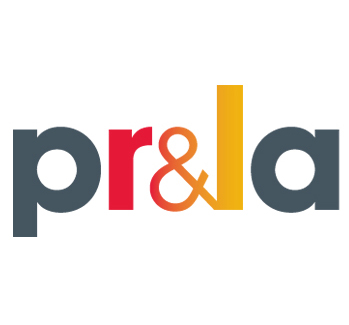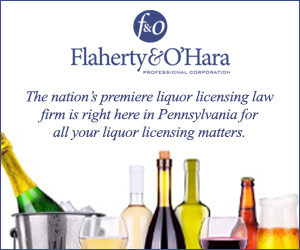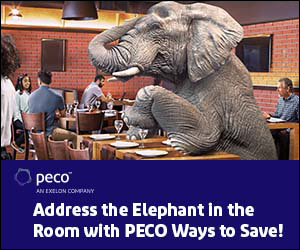Industry of Goodness
“Being a good neighbor is simply good for business,” wrote Jim Fris, PRLA vice chairman and COO of PJW Restaurant Group, for FSR Magazine this summer. “Community outreach remains one of our guiding principles and is fully ingrained in our culture. By supporting causes and groups that our customers care about, we’ve gained an enormous amount of attention, respect, and all-around trust.”
One of PJW Restaurant Group’s most well-known and longest running charitable efforts is the Shamrock Fundraiser for the Ronald McDonald House. It runs February through March, encourages friendly competition between locations, and makes it easy for customer to participate. In 2017, they presented a check for $136,000.
America’s restaurants serve more than meals—the National Restaurant Association research found that 94 percent of restaurants make charitable contributions and their charitable giving adds up to $3 BILLION (with a “B”) a year. Their charitable giving takes many forms—from designating a percentage-of-sales day to donating surplus food to a food bank to holding events to benefit a cause or charity and more. The American Hotel & Lodging Association found in its biennial lodging survey that 85 percent of hotels contribute to charity, make in-kind contributions, and donate volunteer hours by their employees.
Our members give back to their communities in numerous ways. In this issue of Restaurant & Lodging Matters, we are pleased to share with you a few stories of Pennsylvania’s Industry of Goodness.
First of a Kind
On World Autism Day, April 2, 2018, Sesame Place became the first theme park in the world designated as a Certified Autism Center by the International Board of Credentialing and Continuing Education Standards (IBCCES). The park offers special activities for children with special needs, a downloadable sensory guide for families planning to visit, quiet rooms, low-sensory areas, and other services from staff members who have undergone extensive training on autism sensitivity and awareness.
Brigit Katz of Smithsonian.com reported that improving accessibility at the park is part of a broader initiative by the Sesame brand to embrace the needs of children on the spectrum. A Muppet named Julia, who has autism, was introduced to the cast of “Sesame Street” in 2016. A walk-around Julia character was introduced at Sesame Place last year.
Donating the Surplus
According to FeedingAmerica.org, more than 1.5 million Pennsylvanians struggle with hunger, of which nearly 500,000 are children.
Passed in 1996, the Bill Emerson Good Samaritan Food Donation Act protects restaurants from civil and criminal liability should a recipient get ill or hurt as a result of consumed donated food. Donors are only culpable in cases of gross negligence or intentional misconduct.
Since 2003, the Olive Garden in West Manchester Township, York County has donated more than 70,000 pounds of food to the LifePath Christian Ministries (formerly known as the York Rescue Mission). The other York County Olive Garden, located in Hanover, donates its excess food to the Hanover Area Council of Churches. Both York County restaurants participate in their parent company’s hunger relief program, Olive Garden Harvest, which has local restaurants donating food to their local community food banks. Since 2003, Olive Garden restaurants, which are owned by Darden Restaurants, have donated more than 38 million pounds of food through this program.
More and more food rescue groups, ones that pick up and deliver excess food to food banks/hunger relief agencies, like Fiorenza’s Food for Friends and Bucks County Food Runners, exist today, and technology is making it easier to find them. Apps like Philadelphia’s Food Connect and Pittsburgh 412 Food Rescue use your smart phone to match food donors and beneficiaries and mobilize volunteers to make it happen. Food Connect helped donate uneaten food from the 2016 Democratic National Convention and the 2017 NFL Draft.
Food safety requirements don’t allow these rescue groups to accept food produced by individuals or provide food directly to individuals. All food donations must be produced in a commercial, certified kitchen and cannot have been set out (on a buffet) or unwrapped.
If you would like to connect to a food recovery program and don’t know where to start, give us a call at 800-345-5353—we’re happy to help.
Doing Good in Your Neighborhood
With more than 90 percent of restaurants and 85 percent of hotels involved in community activities, our members and our industry are doing good in their neighborhoods. The tricky part is getting you to talk about the good that you do. Share your story with us at www.prla.org/yourstory, and we’ll talk about your good work on your behalf.
The Little Things Make a Big Difference
As former PRLA chairman Michael Passalacqua, owner of Angelo’s Restaurant in Washington, Pa., says, “I always try to fly under the radar on this [community service].” However, this fall he will be honored with the Washington County Community Foundation Keller Corporate Philanthropy Award for his cumulative years of flying under the radar.
He has sponsored numerous spaghetti and meatball dinners for various community charities, including the Citizens Library, Teen Outreach, First Love Christian Academy, the Humane Society, a Christmas lunch for the cancer ward of the Children’s Hospital in honor of the Olivia Scott Foundation, and numerous individual fundraisers. Not to mention the restaurant gift cards and food he donates to groups with regularity.
The individual fundraiser for a young girl who nearly drowned in her family bathtub was the spark that ignited Michael’s passion for helping individuals within his community. “It was my AHA-moment,” said Michael. “I had done a few before hers but when I did her fundraiser it hit me that I can really help people by doing this. I made a plan to do more and help the fundraiser organizers with a strategy for success.”
Since that AHA-moment, he has helped coordinate individual fundraisers for 6–10 people annually for the last six years.
“These are good, hard-working people who have experienced an unfortunate situation.”
Dinner for Kids
Since 2011, Ollie’s Restaurant, Edwardsville, has provided six meals a week to children at risk of hunger through its Dinners for Kids program. Currently, staff and volunteers prepare and deliver 37,000 meals annually for 120 children. Because Ollie’s uses its own kitchen facilities to cook and package meals, 100 percent of the funds raised for Dinners for Kids—$250,000 to date—are used for meal costs. King’s college conducted research and found that the program has a positive impact on the children’s behavior and academic performance.
While the restaurant’s ownership has changed hands—David Tevet retired last year—the charitable tradition remains very much in tact under new owner, Matthew Borrick.
In 2015, the National Restaurant Association Educational Foundation honored Ollie’s Restaurant with the national Restaurant Neighbor Award. This award highlights the positive contributions restaurants make in their local neighborhoods each and every day. National winners each earn $5,000 in prize money to put toward the charity of their choice.
The National Restaurant Association Restaurant Neighbor Award began accepting nominations for the 2019 award on September 17, and nominations will be accepted through November 5. •
Share your story with us at www.prla.org/yourstory, and we’ll talk about your good work on your behalf.











